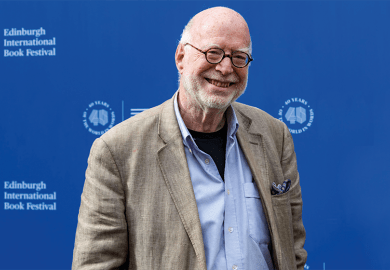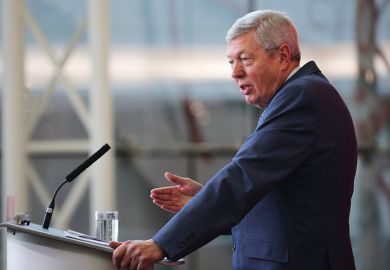Ian Pearson, the Science Minister, and his top official are to demand an explanation for the Arts and Humanities Research Council's proposed cuts to research funding. Dr Pearson and Sir Keith O'Nions, director general of science and innovation, told MPs it was not clear why the cuts were needed. The pair also denied claims of a crisis in science funding and criticised the Science and Technology Facilities Council for complaining of a budget shortfall.
Giving evidence before the House of Commons Innovation, Universities and Skills Select Committee inquiry into research council budget allocations last week, Dr Pearson questioned the AHRC cuts. These include a loss of 500 postgraduate scholarships in the next financial year and a near-halving of both research grants and research leave.
"Its budget is down 1 per cent (taking into account inflation and money to pay 80 per cent of the full economic costs on research) so it is somewhat of a surprise ... that it is planning to see such a major reduction in the first year in terms of its number of research grants," said Dr Pearson. "I will want to inquire why that is the case ... I read the AHRC's delivery plan and it did not come screaming out at me."
"I am similarly perplexed," Sir Keith added. "Overall you would expect some small reduction in (research) volume, but would you expect swingeing cuts? No, frankly."
Sir Keith said he hoped neither the AHRC nor any other council was being "so conservative that they (were) going to underspend". He added that an underspend would be the "single biggest risk" the research councils carried - a reference to last February's government clawback of £68 million in unspent council funds.
The clawback included £5.3 million from the AHRC, leading to recriminations from the science community that the Government had breached the so-called ring-fenced science budget.
The Commons session also saw a deepening of controversy surrounding the STFC budget settlement. The minister and Sir Keith denied there was a funding crisis and took the STFC to task for claiming an £80 million shortfall in its budget.
"This isn't a crisis," said Dr Pearson. He claimed that figures for astronomy grants to universities showed "no net decrease" compared with the last settlement. There were 854 astronomy research grants awarded through the last three years and there would be 855 awarded through the next, he said.
Times Higher Education's analysis confirms that there will be a greater than 25 per cent cut on current grant levels by the end of the period. Grant funding will drop from 329 grants in the current year to around 234 by 2011.
Dr Pearson also referred to the STFC's claimed budget shortfall as the "myth of the £80 million".
"(It) was based on the budget the STFC might have wanted to have, not on its baseline," he said, "I don't know how (the committee) does budgets, but I tend to base them on what my baseline is."
The session also saw the pair questioned over the future of the STFC's Daresbury campus, sparked by fears from scientists that the STFC and the Government are planning to renege on their commitment to develop it. Another session on science budget allocations is scheduled for February.
Adam Afriyie, the Conservative Shadow Minister for Innovation, Universities and Sills, said the minister was "treating scientists like fools" for failing to acknowledge the crisis.
The AHRC and STFC declined to respond to the minister's comments.
COMING TOGETHER? ATC AND THE University of Edinburgh
A formal connection between the Astronomy Technology Centre and the University of Edinburgh is under discussion, Ian Pearson, the Science Minister, has told MPs.
The ATC is considering making up to 50 staff redundant in the wake of budget cuts at the Science and Technology Facilities Council.
Dr Pearson told the Commons Innovation, Universities and Skills Select Committee: "The STFC is at the early stage of discussions with ATC about its future, and one of the options they are discussing is the links and the tie-in with the University of Edinburgh."
He pointed to the Roslin Institute, which was merged with the Edinburgh Laboratory of the Institute for Animal Health and became part of the Edinburgh Biological Research Centre in 2006.
Dr Pearson said: "I understand that people at the ATC have differing views about what their future might be. I'm keen that the STFC listens to those views and comes out with a satisfactory outcome."
Edinburgh denied that any discussions had occurred about a "tie-in" with the ATC.
Edinburgh vice-principal Steve Chapman said the ATC and the university shared many facilities. But referring to the minister's comments, he said: "I just don't recognise this. We are trying to be as helpful as possible and are offering advice to the STFC on request, as we consider the ATC to be critically important for UK astronomy.
"The ball is in the STFC's court, and I believe that its officers are doing their very best in a difficult situation."
The ATC was not available for comment.
Register to continue
Why register?
- Registration is free and only takes a moment
- Once registered, you can read 3 articles a month
- Sign up for our newsletter
Subscribe
Or subscribe for unlimited access to:
- Unlimited access to news, views, insights & reviews
- Digital editions
- Digital access to THE’s university and college rankings analysis
Already registered or a current subscriber? Login



